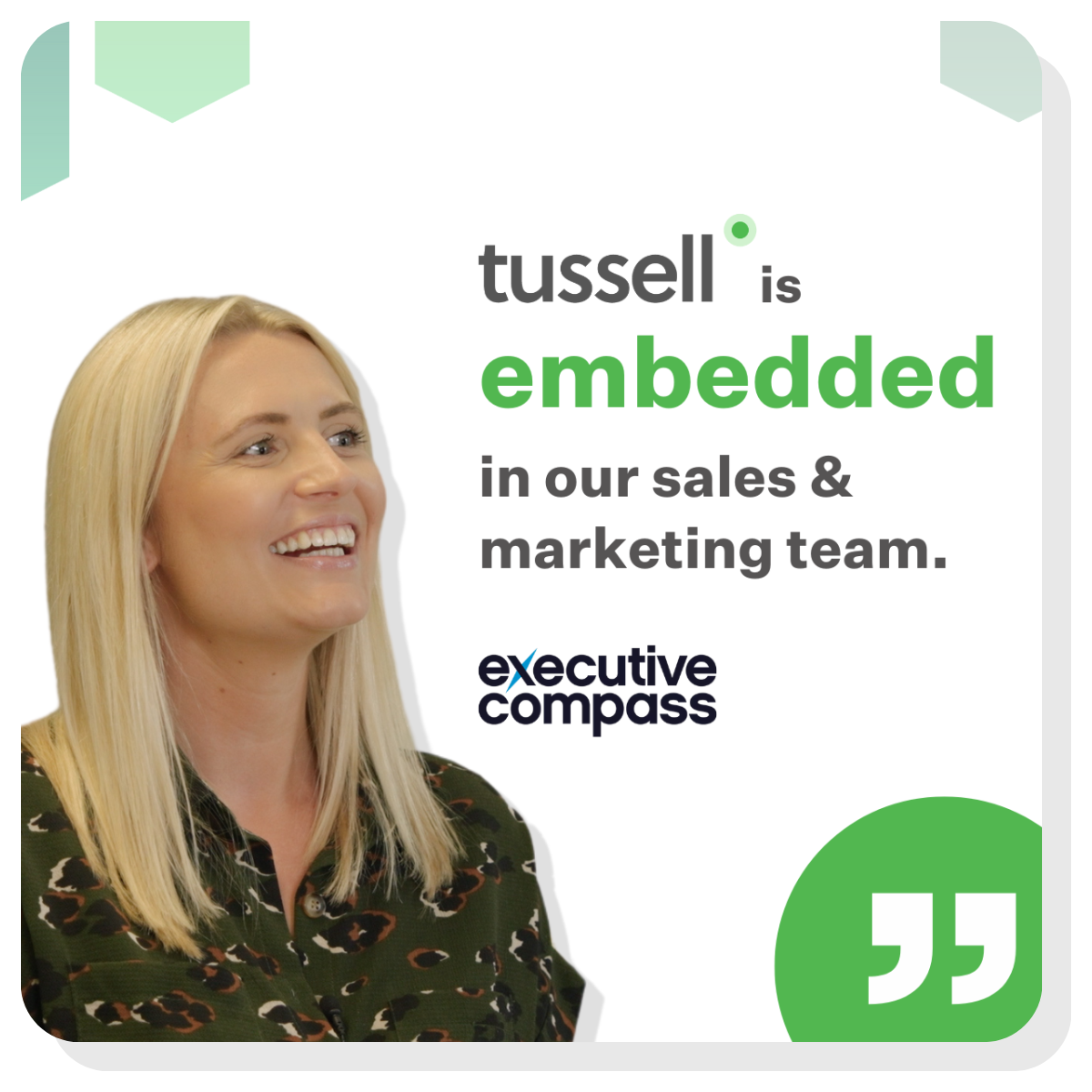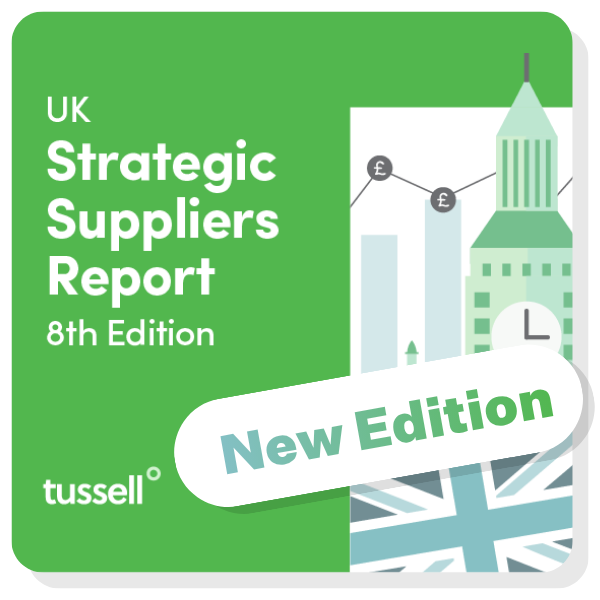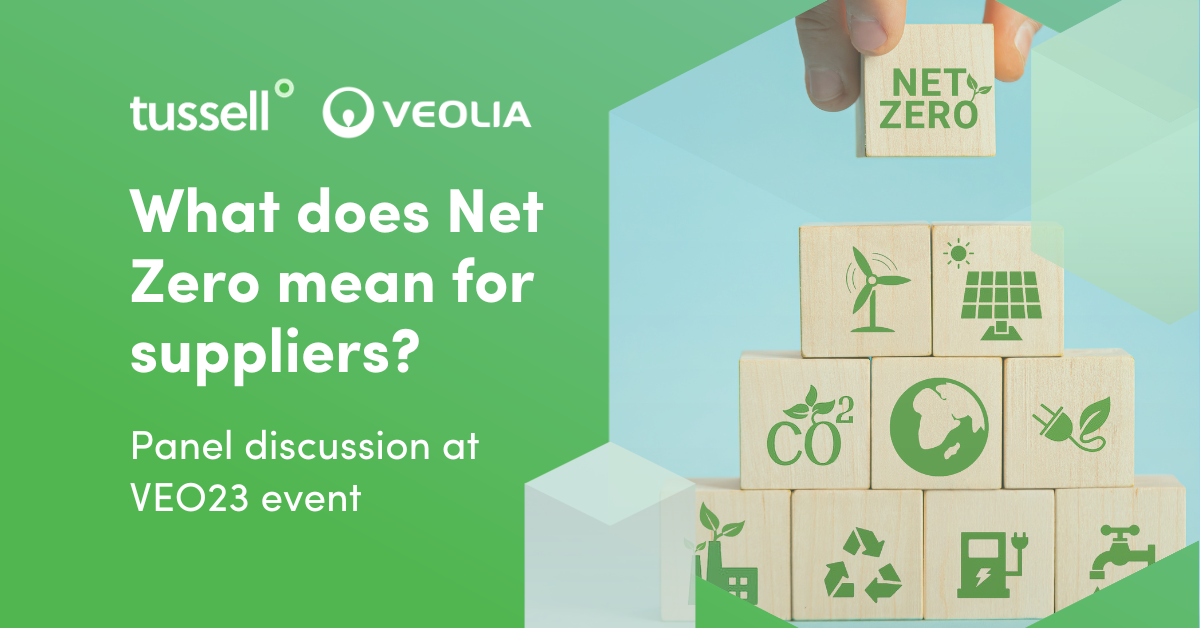On Tuesday 12th September, Tussell attended Veolia UK's VEO23 event.
The summit brought together like-minded people to discuss ecological transformation and net zero.
One of the day's discussions was particularly important for public sector suppliers: 'Does net zero go far enough?'
The panel discussion made clear that the pursuit of a net zero carbon economy carries profound implications for all organisations, not least those supplying into government. Government departments, local authorities and public sector bodies are poised to look more favourably on suppliers committed to reducing carbon emissions and embracing sustainable business practices.
In this blog, we've summarised the panel discussions' key talking points, and asked: what do they mean for you when selling to government?
The Panel:
Natalie Fee, Founder of City to Sea, hosted the discussion and was joined on stay by:
-
Guy Kieser - Associate Director of Estates at Royal Berkshire Hospital;
-
Annabel Mouquet - Executive Vice President of Veolia Water Technologies;
-
John Abraham - Chief Operating Officer at Veolia UK;
-
Christophe Bellynck - Corporate Development Director at Veolia UK;
-
Cory Reynolds - Corporate Affairs and Communications Director at Veolia UK.
9 Key Themes
9 key themes stood out to us during the panel discussion, each worth reflecting on for public sector suppliers.
🎯 Net-Zero Targets and Urgency
The panellists emphasised the critical importance of setting ambitious net-zero targets.
One notable perspective shared during the discussion was the view of the younger generation: Christophe pointed out that the younger generation views achieving net-zero emissions by 2050 as imperative rather than just a distant target. This viewpoint aligns closely with the goals of the Paris Agreement, which seeks to limit global warming to no more than 1.5 degrees Celsius above pre-industrial levels.
This degree of urgency is underpinned by the understanding that exceeding this temperature threshold could lead to catastrophic consequences. It was noted by the panel that [for context], the last time the Earth experienced temperatures 1.5 degrees Celsius above pre-industrial levels was approximately 3 million years ago. During that time, sea levels were significantly higher, with estimates suggesting they were 8 to 10 meters above current levels, offering a stark glimpse of the potential consequences of failing to limit global warming. Achieving this target is seen as essential to safeguarding the planet's future.
What does this mean for public sector suppliers?
The heightened emphasis on ambitious net-zero emissions targets and environmental urgency may compel public sector suppliers to invest in sustainability, innovate in eco-friendly products and services, and adapt to stricter regulations and procurement criteria, while also potentially benefiting from increased demand for sustainable solutions and enhanced brand reputation.
🚫 Challenges and Barriers
The panelists acknowledged the multifaceted challenges and barriers that stand in the way of achieving net-zero emissions. These include:
-
Slow Technology Adoption: The slow adoption of sustainable technologies was identified as a significant challenge. For instance, adopting hydrogen as a clean energy source faces hurdles in terms of practical and economic viability.
-
Policy Uncertainty: The unpredictability of government policies and regulations was cited as a substantial barrier. Clear, consistent, and supportive policies are essential for encouraging investment in sustainable initiatives.
-
Economic Viability: Economic viability is a fundamental factor. For many sustainable solutions, such as hydrogen production and carbon capture, the economics are currently less favourable. This makes it challenging for businesses to transition to these technologies without further support or incentives.
What does this mean for public sector suppliers?
It's undeniable that many challenges are hurdles lay in the path of suppliers looking to adopt more These hurdles may necessitate additional support or incentives from suppliers to make the transition to more sustainable practices economically viable for businesses. You can find out more about Net Zero and UK public procurement in our "What you need to know" blog.
🤝 Collaboration and Partnerships
Collaboration and partnerships were identified as crucial enablers of progress. Panelists highlighted the need for long-term and strategic collaborations among businesses, government bodies, and organisations. Such partnerships should extend across various facets, including supply chain management, infrastructure development, and research and development efforts.
What does this mean for public sector suppliers?
Suppliers need to start building their pipelines earlier so that they have ample time to build relationships with buyers, and the buyer's partners, ahead of putting in a bid. To find out more about how to build your pipeline, check out our How to build a pipeline of public sector procurement opportunities.
🏛️ Regulation and Legislation
Regulatory support and well-defined legislation were considered pivotal drivers of change. Panelists discussed the frustration of waiting for government policies and legislation to align with sustainability goals. They stressed the importance of establishing a regulatory framework that promotes and supports sustainable practices.
What does this mean for public sector suppliers?
Suppliers should anticipate changes in legislation and policies that reflect the government's sustainability aims and prepare, and adjust their offerings accordingly.
💰 Return on Investment (ROI)
Achieving net-zero emissions should make financial sense for organisations. ROI was discussed not only in monetary terms but also in the context of reputation and adaptability within a changing regulatory environment. This comprehensive approach to ROI encourages businesses to embrace and invest in sustainable practices.
What does this mean for public sector suppliers?
As always, demonstrating that your products and services provide good value for money is crucial to doing more business with government.
🖥️ Technology and Innovation
The FM and tech sectors' roles in driving innovation and technological advancements were highlighted. Innovations in critical areas such as hydrogen production and carbon capture are seen as indispensable for making significant strides toward net-zero emissions.
What does this mean for public sector suppliers?
Suppliers may increasingly focus on developing and offering cutting-edge solutions in these areas, aligning their products and services with the public sector's goals of achieving net-zero emissions. This could involve increased collaboration, research, and investment in innovative technologies to meet the growing demand for sustainable solutions in the public sector.
🏗️ Infrastructure Development
The importance of infrastructure development, particularly in the energy sector, was underscored. The panelists pointed out that the pace of infrastructure development, including the expansion of renewable energy sources and sustainable transportation networks, is a key factor influencing the speed of the transition to net zero emissions.
What does this mean for public sector suppliers?
Due to this growing demand, suppliers will need to offer more services and products that can facilitate and accelerate the government's net zero adoption. You can find out more about net zero and UK public procurement in our blog, Net Zero & UK Public Procurement: What you Need to Know.
🎓 Engagement and Education
The panelists stressed the significance of engaging with the public and providing education on environmental issues. They noted that consumer awareness plays a pivotal role in driving more sustainable choices and many people are unaware of the ecological impact of their consumption.
Raising public consciousness and encouraging environmentally responsible decisions are integral parts of the journey towards net-zero emissions. Greater transparency and consumer awareness can drive more sustainable choices.
What does this mean for public sector suppliers?
These changes may entail a greater emphasis on offering sustainable products and services, aligning with infrastructure development needs, and engaging in public awareness and education initiatives to support the public sector's goals of achieving net-zero emissions and promoting environmentally responsible choices among consumers.
💚 Policy Advocacy and Industry Unity
The discussion concluded with a call to action for the industry to unite and advocate for policies that support sustainability and net-zero goals. A collective effort from the private sector is considered essential for influencing policymakers and creating an environment conducive to sustainable practices.
What does this mean for public sector suppliers?
Public sector suppliers must take a more active role in driving the adoption of sustainable policies and practices within the public sector. This change could involve greater engagement in lobbying efforts, participating in industry associations, and working closely with government bodies to shape regulations and create a conducive environment for sustainable practices.
What does this all mean for suppliers?
For suppliers in the public sector, net zero carries significant implications.
Promoting sustainability, reducing emissions, and better understanding of environmental impacts are all growing priorities for public buyers.
As such, contracting authorities are likely to look favourably on suppliers that can either provide technologies or services directly tied to the net zero transition, and/or organisations that clearly exhibit a commitment to net zero through their business practices.
Suppliers should anticipate increased demand for green technologies and solutions related to renewable energy, energy efficiency, and carbon capture. Staying aligned with evolving sustainability regulations and collaborating on sustainability initiatives with public sector entities will be essential.
Investment in innovation, particularly in sectors like energy, transportation, and infrastructure development, will become paramount.
Suppliers should also consider their role in raising consumer awareness about environmental issues and advocating for policies that support sustainability and net-zero goals.
Ultimately, embracing sustainability as a core value and actively participating in industry efforts will position suppliers favourably in a public sector increasingly focused on sustainability.
Concluding Remarks
In summary, the panellists expressed a strong commitment to addressing environmental challenges and achieving net-zero emissions. They highlighted the need for collaborative efforts, innovative solutions, and robust policy support to expedite progress toward a sustainable and environmentally responsible future.
Suppliers who prepare for this elevated interest in eco-friendly solutions and prioritise innovative approaches are more likely to stand out when competing for public sector business.
To find out more about this event, please head to Veolia UK's VEO23 hub or get in touch with us to discuss this topic further.
Thank you to Veolia UK for the invitation to their annual event and to all the speakers for their insightful talks - it has really got us thinking!
*
You can find out more about net zero and UK public procurement in our blog, Net Zero & UK Public Procurement: What you Need to Know.
Tussell's market intelligence platform is already being used by top suppliers to track new public sector opportunities, dig into their target accounts, see who their competitors are working with, and understand which frameworks they should get onto to win more work.
Book a personalised demo with our team to see how Tussell can unlock public sector insights and opportunities for your business.




%20v1.png)










